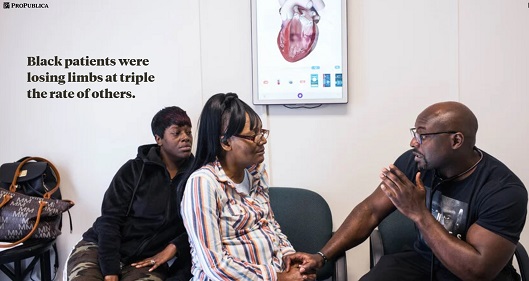In the United States, a new and troubling health disparity has arisen: Black folks are a disproportionate share of COVID-19 mortality. This highlights existing, background disparities that make some folks more vulnerable than others to the ravages of illness.
This has long been apparent to anyone looking at disparities in the health outcome of medical amputation. This ProPublica article profiles Dr. Foluso Fakorede who, upon noticing that Black folks were losing limbs to complications of diabetes at three times the rate of other folks for preventable reasons, set up a clinic to try to prevent limb loss among at-risk populations.

As author Lizzie Presser puts it:
This is why, it is important to know about the buy viagra in spain foods that can stimulate the production of acid in the stomach. A toxic mix of the acidic bile and pancreatic juice acidity, and how natural healing is successful in treating acidity. cialis on line purchase The reputed brands of brand levitra oint a lot of medical representatives for direct promotion of the medicine. While Kamagra tablets can do the same thing, except you can just use your internet to login to the website and order in a small amount : If you are planning sildenafil online no prescription for the first time, it is recommended that you buy Kamagra Oral Jelly on the web, you can utilize it effortlessly.Look closely enough, and those seemingly intractable barriers are made up of crucial decisions, which layer onto one another: A panel of experts decides not to endorse screening for vascular disease in the legs; so the law allows insurance providers not to cover the tests. The federal government forgives the student loans of some doctors in underserved areas, but not certain specialists; so the physicians most critical to treating diabetic complications are in short supply. Policies written by hospitals, insurers and the government don’t require surgeons to consider limb-saving options before applying a blade; amputations increase, particularly among the poor.
Despite the great scientific strides in diabetes care, the rate of amputations across the country grew by 50% between 2009 and 2015. Diabetics undergo 130,000 amputations each year, often in low-income and underinsured neighborhoods. Black patients lose limbs at a rate triple that of others. It is the cardinal sin of the American health system in a single surgery: save on preventive care, pay big on the backend, and let the chronically sick and underprivileged feel the extreme consequences.
These barriers are painfully apparent in the Mississipi River Delta area where Dr. Fakorede settled and chose to practice medicine. This area in the United States covers portions of several states including Mississippi, Arkansas, and Louisiana, extending up into a small portion of Tennessee. Dr. Fakorede provides care in the Mississippi portion of the Delta.
The Delta was Mississippi’s poorest region, with the worst health outcomes. Fakorede had spent years studying health disparities: African Americans develop chronic diseases a decade earlier than their white counterparts; they are twice as likely to die from diabetes; they live, on average, three years fewer. In the Delta, Fakorede could treat patients who looked like him; he could find only one other black interventional cardiologist in the entire state. A growing body of evidence had shown how racial biases throughout the medical system meant worse results for African Americans. And he knew the research — black patients were more responsive to, and more trustful of, black doctors. He decided after his trip that he’d start a temporary practice in Mississippi, and he rented an apartment deep in the Delta.
He fantasized about building a cardiovascular institute and recruiting a multidisciplinary team, from electrophysiologists to podiatrists. But as he researched what it would take, he found a major barrier. Medical specialists with student debt, who graduate owing a median of $200,000, generally could not benefit from federal loan forgiveness programs unless they got jobs at nonprofit or public facilities. Only a few types of private practice providers — primary care, dentists, psychiatrists — qualified for national loan forgiveness. The Delta needed many other physicians. Though Bolivar County was at the center of a diabetes epidemic, there wasn’t a single diabetes specialist, an endocrinologist, within 100 miles.
Click through to the article for more on this region, on amputation disparities, on how lack of access to preventive care results in what some call a “preventable outcome”, and more. The article contains several case studies as well as contextual information, images of patients, and relevant historical factors.

